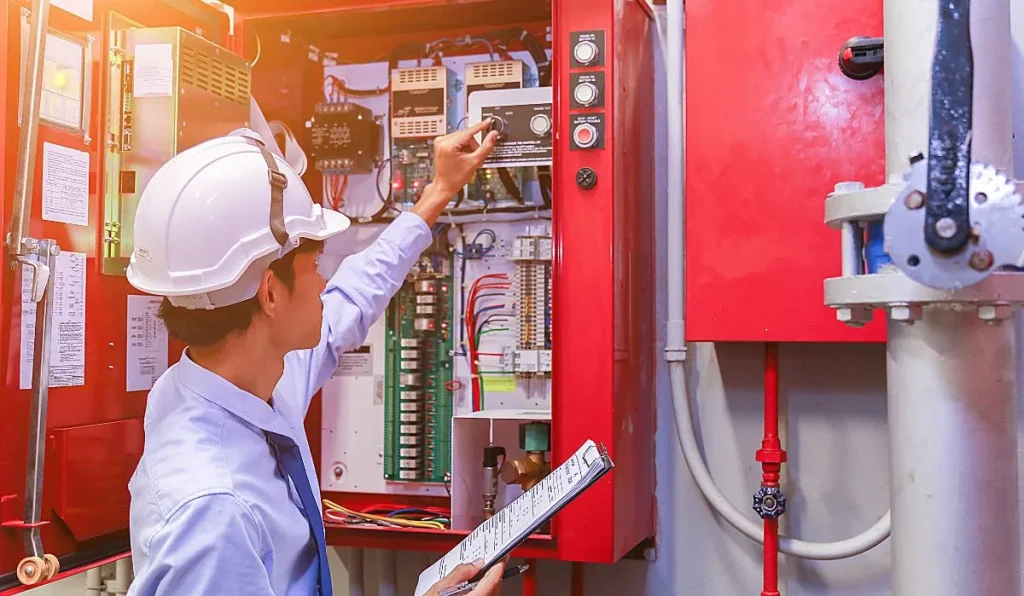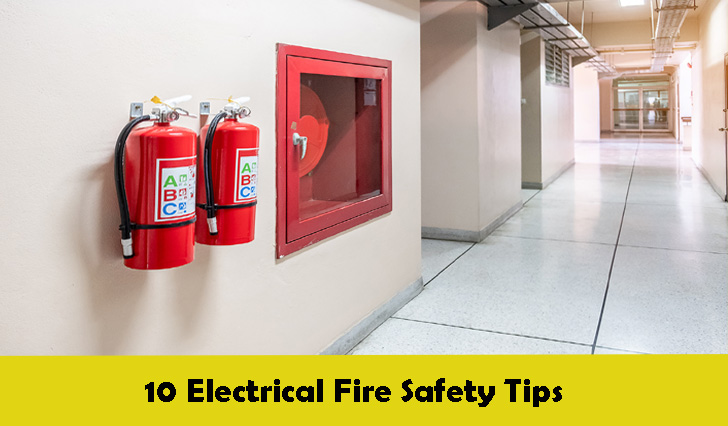Electrical safety is crucial for preventing injuries, equipment damage, and potential fire hazards. Through this guide, we will try to give an overview of 10 Electrical Fire Safety Tips. This guide covers top tips and essential practices for proper safety in residential and commercial settings.
What is Electrical Safety?
Electrical safety refers to practices and precautions taken to reduce electrical hazards such as shocks, fires, and equipment damage. It involves proper installation, regular maintenance, safe use of devices, and awareness of potential risks. Ensuring electrical safety protects people from injury, prevents property damage, and maintains system efficiency in homes and businesses.
Visit our detailed article to learn more about the importance of electrical substantial services in Bangladesh.
Why Electrical Safety Matters
Electrical safety encompasses a range of practices aimed at minimizing risks such as electric shocks, fires, and equipment failures. Proper installation, regular maintenance, safe usage, and hazard awareness are vital components of electrical safety. These measures not only protect individuals but also safeguard property and maintain system efficiency.
Electrical Fire Safety Tips 2025
Turn Off Electrical Appliances When Not in Use
One of the easiest ways to reduce electrical risks is to ensure all electrical appliances are turned off after use. Leaving devices plugged in or powered on when not needed increases the chances of overheating, short circuits, and electrical fires.
- Home Tip: Unplug devices like toasters, kettles, and chargers when not in use.
- Workplace Tip: Ensure office equipment such as computers, printers, and coffee machines are powered off at the end of the day.
This practice also conserves energy and reduces electricity bills.
Avoid Overloading Circuits
Overloading electrical outlets and extension cords is a common cause of electrical fires. Every circuit has a specific capacity. And exceeding it can cause overheating and potential fire hazards.
- What to Avoid:
- Plugging multiple high-power devices into the same outlet.
- Using cheap or low-quality extension cords.
- Solution:
- Use a power strip with surge protection.
- Distribute devices across multiple outlets to balance the electrical load.
- Confirm the total wattage does not exceed the circuit’s capacity.

Inspect Cords and Extensions Regularly
Damaged cords and extension leads are a significant safety risk. Cuts, breaks, and exposed wires can cause electric shocks and fires. Regular inspections can help detect these issues before they become dangerous.
- Inspection Tips:
- Check cords for any visible damage, such as fraying or exposed wires.
- Avoid using cords with cracks or splits.
- Keep cords away from heat sources, moisture, and sharp edges.
- Use extension cords that match the power requirements of your devices.
Always replace damaged cords immediately to prevent electrical hazards.
Schedule Regular Equipment Maintenance
Electrical equipment, especially in workplaces, requires regular maintenance to ensure safe operation. Faulty devices can cause sparks, overheating, or electric shocks, posing a significant safety risk.
- Maintenance Tips:
- Establish a regular inspection schedule for all electrical equipment.
- Check portable appliances and machinery for wear and tear.
- Immediately remove faulty equipment from use and arrange for repairs.
Routine maintenance ensures all equipment remains in good working condition, reducing the risk of accidents.
Hire Competent Professionals for Electrical Work
Electrical installations, repairs, and inspections should always be performed by qualified electricians. Attempting DIY electrical work without proper knowledge can lead to serious accidents, including shocks and fires.
- Why Hire Professionals:
- They ensure compliance with safety regulations.
- They have the expertise to point out hidden issues.
- They guarantee the work is done safely and correctly.
Hiring a certified electrician gives you peace of mind. Knowing that your electrical systems are safe.
Keep Control Panels Accessible: Electrical Fire Safety Tips
Electrical control panels should always be easy to access in case of an emergency. Blocking access can delay swift shutdowns during electrical faults, increasing the risk of injury and property damage.
- Tips for Maintaining Access:
- Keep a clear space of at least 3 feet around control panels.
- Ensure the control panel is labeled for easy identification.
- Regularly inspect the panel to ensure it is functioning correctly.
Quick access to control panels allows for fast action during power surges or electrical malfunctions.
Report Electrical Faults Promptly
Ignoring electrical faults can escalate into more significant safety issues. Faulty wiring, flickering lights, and frequent tripping of circuit breakers are signs of underlying problems that require immediate attention.
- Common Faults to Report:
- Sparks from outlets.
- Burning smells near appliances or outlets.
- Flickering or dimming lights.
- Circuit breakers tripping frequently.
Encourage employees or family members to report electrical faults promptly to avoid accidents.
Maintain Machines Regularly to Prevent Overheating
Machines and appliances can overheat if they are not regularly maintained, leading to sparks, smoke, or even fires. A proper maintenance schedule can prevent these issues.
- Tips for Machinery Maintenance:
- Clean machines regularly to prevent dust buildup.
- Check for worn-out parts and replace them immediately.
- Confirm all moving parts are lubricated to reduce friction.
Preventive maintenance reduces the likelihood of overheating, keeping machines safe and efficient.
Conduct Fixed Wiring Inspections
Fixed wiring systems, such as electrical panels, circuit breakers, and outlets, need regular inspections to ensure they remain safe and functional. Over time, wiring can degrade or become damaged. Increasing the risk of electrical accidents.
- Inspection Frequency:
- Conduct a comprehensive inspection every 5 to 10 years in homes.
- In workplaces, inspections should be more frequent, depending on the type of electrical system and its usage.
- Why Hire a Certified Electrician:
- They can identify hidden issues in the wiring.
- They ensure compliance with safety regulations.
Regular wiring inspections can prevent major hazards and ensure the safety of your electrical system.
Perform Portable Appliance Testing (PAT)
Portable Appliance Testing (PAT) involves checking the safety of electrical appliances for proper safety to use. This is particularly important in workplaces where portable devices are used frequently.
- Who Should Perform PAT:
- A qualified professional with the necessary PAT testing equipment.
- What PAT Involves:
- Visual inspections of appliances.
- Checking for damage to cords, plugs, and internal wiring.
- Conducting electrical tests to ensure devices operate safely.
Regular PAT testing ensures all portable appliances meet safety standards, reducing the risk of shocks and fires.
Home Electrical Safety Tips
- Avoid overloading outlets.
- Plug heating and cooling appliances directly into wall outlets.
- Keep cords out of high-traffic areas and away from rugs or furniture.
- Use tamper-resistant outlets in homes with children.
- Charge devices on hard surfaces and avoid overcharging.
Why Choose Reliant-EST for Electrical Safety Services?
At Reliant-EST, we prioritize your safety by offering:
- Comprehensive electrical safety audits.
- Professional installation and repair services.
- Regular maintenance and inspection programs.
- Expert advice tailored to your specific needs.
Our team is committed to providing reliable, efficient, and affordable electrical safety solutions. Trust us to keep your home and workplace safe.
Visit our detailed guide to know more about essential fire safety tips for manufacturing plants.
Conclusion: Electrical Fire Safety Tips
Electrical fire safety is the most crucial thing. To keep people and things safe and secure. Electrical fires can be prevented by following these 10 Electrical Fire Safety Tips. We and our love one can remain safe by being aware and through action. Because prevention is the most important thing. All these tips will help us enjoy the benefits of electricity. At the same time, preventing the risks.
Frequently Asked Questions (FAQs): Electrical Fire Safety Tips
Q1. What is the importance of electrical safety?
Electrical safety prevents injuries, equipment damage, and fire hazards, ensuring a secure and efficient environment.
Q2. How often should electrical systems be inspected?
It is recommended to inspect electrical systems annually or as per the guidelines provided by a certified electrician.
Q3. What is Portable Appliance Testing (PAT)?
PAT involves inspecting and testing portable electrical devices to ensure they are safe for use.
Q4. Can I perform electrical repairs myself?
Electrical repairs should always be performed by qualified professionals to avoid risks and ensure compliance with safety standards.
Q5. What are common signs of electrical faults?
Signs include exposed wires, overheating, burn marks, and tripping circuit breakers.
Q6. How can I prevent overloading circuits?
Avoid plugging multiple high-power appliances into the same outlet or extension cord. Use power strips with built-in surge protection.

